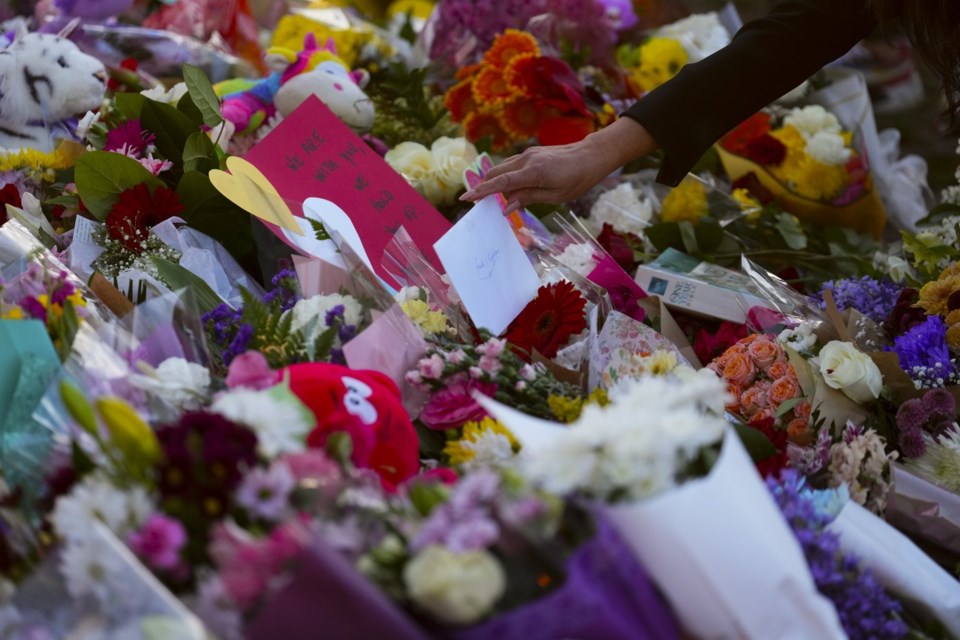VANCOUVER — Communal grief following the ramming attack at a Filipino festival in Vancouver that killed 11 people on the weekend will likely persist for months, mental health experts in British Columbia warn.
"Traumatic events, grief, is not something that is resolved in a week or two weeks, or a couple of months," said Heather Mohan, a clinical counsellor and executive director of the charity Lumara Grief and Bereavement Care Society.
Eleven people were killed and dozens more were injured when a vehicle sped through a crowded street lined with food trucks at the Lupa Lupa Day festival, sending victims flying through the air. The 30-year-old suspect faces eight counts of second-degree murder so far and police have said more charges are expected.
Such an attack, along with environmental disasters, suicide clusters and mass shootings, can trigger collective trauma, University of British Columbia sociology professor Seth Abrutyn said.
Collective trauma is the "sudden, acute destruction of social infrastructure," including social bonds and community relationships, he explained.
The concept, Abrutyn said, was identified by a sociologist more than half a century ago, who was studying the impacts of a flood that ravaged a town in the 1970s.
Abrutyn said research has shown the impacts of such an event can spread beyond those who were injured or were witnesses to the larger cultural community, some of whom may live across the country or world.
"Vicarious trauma can spread, and even more so with social media because we're exposed to so much of it," Abrutyn said.
But the processing of grief can also be a collective experience, and Arbutyn said communities can do this by honouring and remembering those who died, either by acknowledging them at future culture events or by creating respectful shrines or memorials.
Flowers began piling up on Sunday morning around the police perimeter at the attack scene in South Vancouver, and vigils have also been held to support the local Filipino community.
B.C.'s Health Ministry said in a statement Wednesday that "immediate supports" have been made available for those impacted by the tragedy as it works to better understand what resources are needed. That includes providing mental health helplines, support for health workers, and offering a condolence book for residents to sign, it said.
"This was a traumatic event for everyone involved and we encourage anyone who needs support to reach out for help," the ministry said. "The response to this traumatic event is on-going, and we will continue to provide updates to people as we move forward."
Fundraising campaigns have been set up to help the families of those killed and the Philippine Consulate General in Vancouver began offering support through a national hotline.
Abrutyn said collective trauma may lead to anxiety or post-traumatic stress disorder and worries about another imminent threat, no matter how unlikely.
If unaddressed, grief may have more devastating consequences, Mohan said.
"When people do not have the support that they need around a death, it can turn inward and become a much more serious mental health problem than it ever needs to be," she said.
That, she said, could include depression, suicide or substance misuse. It can also cause physical ailments or exacerbate chronic illnesses or pain, she added.
Leigh McCarley Blaney, a professor at Vancouver Island University and a member of the Centre for Trauma and Mental Health Research, highlighted the need for community support, emotional expression and maintaining cultural practices in recovery of communal tragedies.
"Resilience doesn't mean not feeling or not reacting, but it's really about finding pathways through these terrible events," she said.
That could be through support groups, faith groups, sports, activities or volunteering, she said. Open communication is essential, she added.
"It's important to acknowledge the grief and trauma and horror from this event, and to remember that there may be some pathways through this over the next while that will help people not come to terms with, not get over, but to find a new reality and a new normal."
Mohan said cases like the Lapu Lapu attack emphasize a need for plans to address long-term impacts of grief and trauma.
"We need to support people in the aftermath of these tragedies," she said.
"We need governments to respond and to create national and provincial bereavement strategies so that when these tragedies happen, resources are in place and people don't have to go scrambling around to look for them, and (to ensure) resources are in place beyond that immediate week or two weeks around the event."
This report by The Canadian Press was first published April 30, 2025.
Brieanna Charlebois, The Canadian Press



